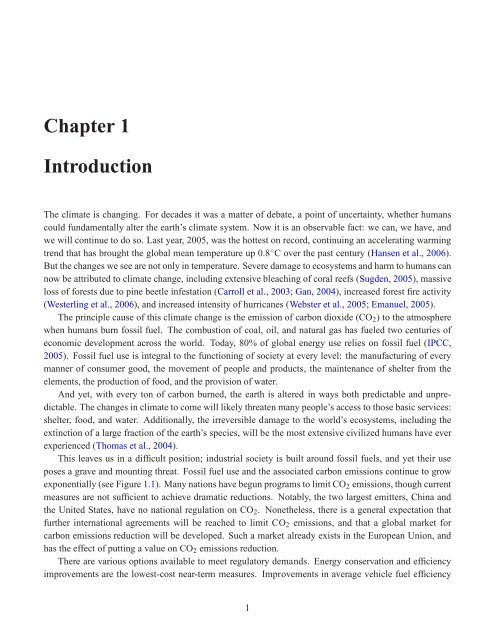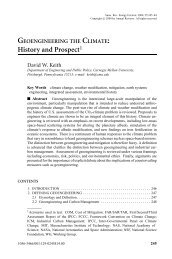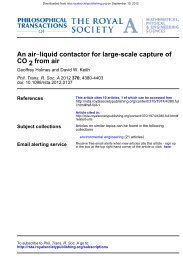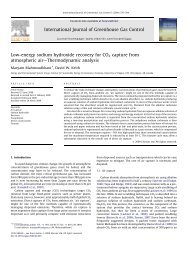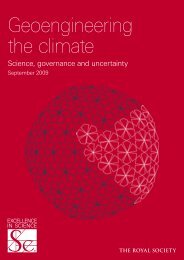Capturing CO2 from ambient air - David Keith
Capturing CO2 from ambient air - David Keith
Capturing CO2 from ambient air - David Keith
Create successful ePaper yourself
Turn your PDF publications into a flip-book with our unique Google optimized e-Paper software.
Chapter 1<br />
Introduction<br />
The climate is changing. For decades it was a matter of debate, a point of uncertainty, whether humans<br />
could fundamentally alter the earth’s climate system. Now it is an observable fact: we can, we have, and<br />
we will continue to do so. Last year, 2005, was the hottest on record, continuing an accelerating warming<br />
trend that has brought the global mean temperature up 0.8 ◦ C over the past century (Hansen et al., 2006).<br />
But the changes we see are not only in temperature. Severe damage to ecosystems and harm to humans can<br />
now be attributed to climate change, including extensive bleaching of coral reefs (Sugden, 2005), massive<br />
loss of forests due to pine beetle infestation (Carroll et al., 2003; Gan, 2004), increased forest fire activity<br />
(Westerling et al., 2006), and increased intensity of hurricanes (Webster et al., 2005; Emanuel, 2005).<br />
The principle cause of this climate change is the emission of carbon dioxide (<strong>CO2</strong>) to the atmosphere<br />
when humans burn fossil fuel. The combustion of coal, oil, and natural gas has fueled two centuries of<br />
economic development across the world. Today, 80% of global energy use relies on fossil fuel (IPCC,<br />
2005). Fossil fuel use is integral to the functioning of society at every level: the manufacturing of every<br />
manner of consumer good, the movement of people and products, the maintenance of shelter <strong>from</strong> the<br />
elements, the production of food, and the provision of water.<br />
And yet, with every ton of carbon burned, the earth is altered in ways both predictable and unpredictable.<br />
The changes in climate to come will likely threaten many people’s access to those basic services:<br />
shelter, food, and water. Additionally, the irreversible damage to the world’s ecosystems, including the<br />
extinction of a large fraction of the earth’s species, will be the most extensive civilized humans have ever<br />
experienced (Thomas et al., 2004).<br />
This leaves us in a difficult position; industrial society is built around fossil fuels, and yet their use<br />
poses a grave and mounting threat. Fossil fuel use and the associated carbon emissions continue to grow<br />
exponentially (see Figure 1.1). Many nations have begun programs to limit <strong>CO2</strong> emissions, though current<br />
measures are not sufficient to achieve dramatic reductions. Notably, the two largest emitters, China and<br />
the United States, have no national regulation on <strong>CO2</strong>. Nonetheless, there is a general expectation that<br />
further international agreements will be reached to limit <strong>CO2</strong> emissions, and that a global market for<br />
carbon emissions reduction will be developed. Such a market already exists in the European Union, and<br />
has the effect of putting a value on <strong>CO2</strong> emissions reduction.<br />
There are various options available to meet regulatory demands. Energy conservation and efficiency<br />
improvements are the lowest-cost near-term measures. Improvements in average vehicle fuel efficiency<br />
1


